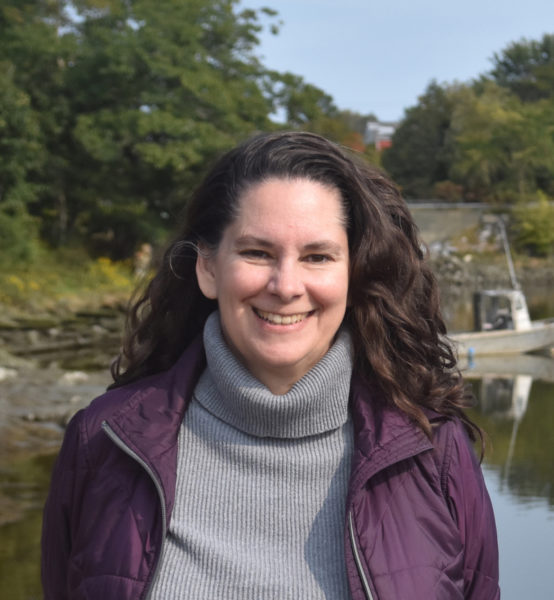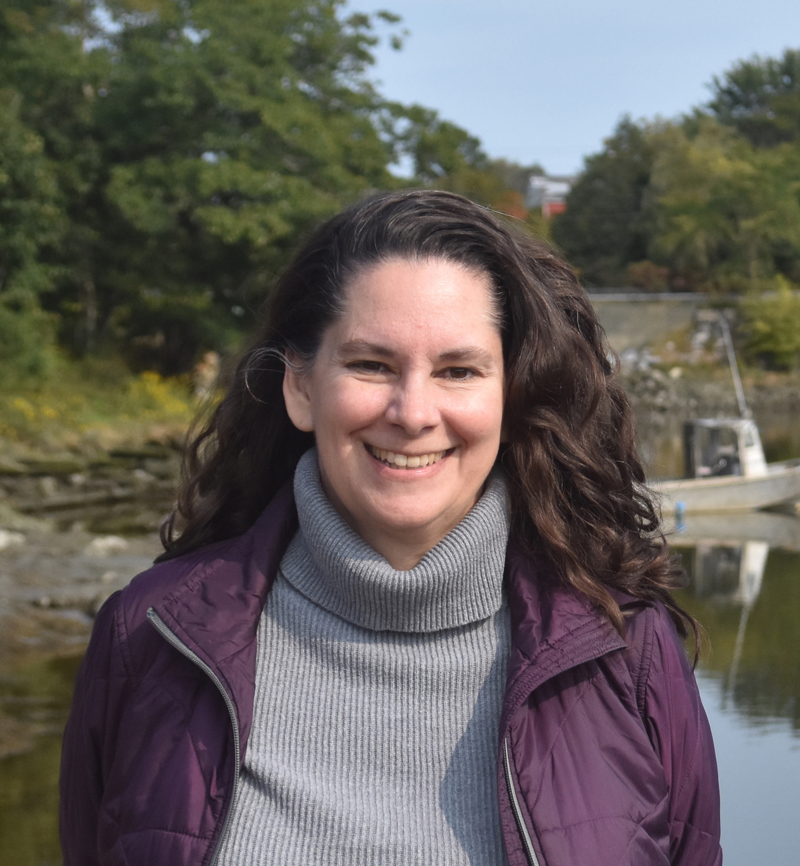
Jennifer Stone (Molly Rains photo)
Jennifer A. Stone, D-Waldoboro, said she is focused on health care, rising costs, and listening to constituents in her bid to represent House District 45.
In the race, Stone challenges state Rep. Abden Simmons, who has held the office since a special election in 2023. House District 45 consists of Bremen, Friendship, Louds Island, Waldoboro, and Washington.
Stone, originally from Fall River, Mass., came to Maine as a student at Unity College in the 1990s. She graduated in 1998 with a bachelor’s in environmental science. At the time, Stone was interested in continuing her work in science, imagining herself as a science teacher.
“I have always loved nature and being outside,” she said.
This is evident in the range of jobs Stone has held. As a trained EMT, Stone was a member of the student emergency response team at Unity. After graduating, she traveled to Alaska to work in a pink salmon hatchery before relocating to San Francisco, where she worked in a native plant nursery with the Golden Gate Parks Association.
Stone then began sustainability work with The Presidio Trust, an organization that stewards a national park near the Golden Gate Bridge called the Presidio.
As a sustainability assistant at Presidio, Stone applied her environmental science background to make the park’s operations more sustainable, such as by piloting a biodiesel program with the park’s roads and grounds crews and by implementing a green purchasing program for office supplies.
Later, while still on the west coast, Stone took on roles as a vessel support specialist and office manager at The Marine Exchange of San Francisco, a nonprofit that collects and analyzes data about shipping traffic in the San Francisco bay area.
Stone returned to Maine in 2004 to take a role as assistant director of admissions at Unity College. Stone said her experience working with students and families had made her a perceptive listener, a skill she would apply to representing constituents.
“I’ve been around a lot of families, and I think I know what their primary concerns are,” she said.
Stone also said that, though she would bring her environmental perspective to the Legislature, she was interested in taking on a wide range of issues and learning about areas with which she is less familiar.
“Even though I have that background and I would like to apply it … not everybody can do these things,” she said. “There are other things that are less glamorous that need to be taken care of also.”
Stone met her husband, Charles, after returning to Maine. In 2005, the couple settled in Waldoboro. They had one son, now a senior at Medomak Valley High School, who Stone left work to raise.
“I say I was a stay at home mom, but we had a homestead. We had cows, we had a variety of birds, ducks and chickens and geese, and a huge garden, and we were heating with wood – so I guess there’s a work ethic there,” Stone said.
Stone also worked at Rising Tide Co-op in Damariscotta after moving to the area. More recently, she was employed at the PenBay YMCA, though she went down to on-call status after deciding to run for the Legislature, saying she wanted to free her weekends for canvassing.
Stone has never before held elected office. Her decision to run now, she said, came from a desire to serve, frustration with the state of politics nationwide, and a conviction that local action is the most influential.
“I realized that, if there are going to be any changes, they have to be local. Those are the ones that you feel the most,” she said.
Stone believes the Legislature could affect those changes not only through lawmaking but also by serving as an example for across-the-aisle collaboration.
“I think (the Legislature’s) biggest role is to be an example in conversation,” she said.
Stone identified the state of health care as one of the major areas she hopes to make progress in if elected.
“My biggest concern is health care. Forty percent of Mainers have medical debt, and I find that heartbreaking. Medical debt is something that I feel should not even exist,” she said.
Stone said she believed the prevalence of Maine individuals and families without health insurance, including those who work full-time, was a contributing factor. As of 2022, 6.6% of Maine residents did not have health insurance, according to data from the state’s Maine Shared Community Health Needs Assessment.
Stone said extending health care coverage to more residents would help reduce medical debt, empowering residents to invest in other areas of their lives.
“All that money for their debt – they could be investing that money in their children’s education or local businesses or their retirement; things that, down the line, cost more money,” Stone said.
Stone’s approach to health care is one example of a principle she said describes her take on many issues: “No matter what we’re looking at, whether it’s health care, education, prison reform, public transportation, housing, it’s cheaper to be nice,” she said.
To Stone, this means taking a proactive approach to solving problems, such as making an up-front investment that will save money in the long term. In terms of health care, improving access to health insurance would reduce Mainers’ medical costs in the long run by helping ensure they access measures like preventative care, she said.
“It’s just heartbreaking … our health care system needs a complete overhaul. I just don’t know how to go about that, but I’m hoping that I can work with other legislators to break it down and make it better,” she said.
Stone identified the state of Maine’s public schools as an example of a situation in which deferred maintenance has allowed problems to fester. RSU 40, where Stone’s son is a student, was at the center of a discussion around deferred maintenance costs last year, when a $81 million bond requested by the district for maintenance and upgrades district-wide was ultimately struck down by voters in November 2023.
“All the research shows that the learning environment is important to performance… Our schools are in need of a lot of maintenance, and maintenance that has been neglected for many years,” she said, speaking in favor of funding education.
Hunger is another example of an issue in which it’s “cheaper to be nice,” Stone said, pointing to the statewide free school breakfast and lunch program that resulted from the passage of Maine’s School Meals for All legislation in 2021.
To address hunger, there is likely more that could be done, Stone said, such as increasing the child tax credit or lowering the requirements for food assistance program eligibility.
While campaigning, Stone said she had found that constituents across the political spectrum shared one central concern: worries over rising taxes and the cost of living.
As one way to address this, Stone said she would be in favor of reinstating Maine’s property tax stabilization program for senior citizens to help older residents age in place “with dignity.”
She also identified a lack of affordable housing statewide as a contributing factor to economic stress for Mainers of all ages. There were more steps, Stone said, that could be taken in addition to L.D. 2003, Maine’s recent housing law change that attempted to improve housing conditions such as by allowing multiple dwellings to be built on one lot.
“It’s great that it’s been passed so people have the option, but not everybody can afford the option (of building an additional dwelling)” Stone said. “More needs to be done for affordable housing in rural areas.”
Stone is endorsed by Planned Parenthood Maine Action Fund PAC, Equality Maine, AFL-CIO, and People’s Alliance.
While Stone’s homestead no longer hosts the livestock it used to, she still enjoys gardening and spending time with her family.
For more information, find Jennifer Stone for Maine House on Facebook.
The general election will be held on Tuesday, Nov. 5.
(Except for the headline, this story has not been edited by PostX News and is published from a syndicated feed.)

